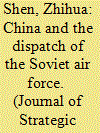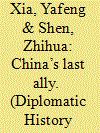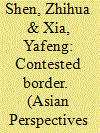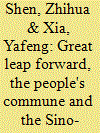|
|
|
Sort Order |
|
|
|
Items / Page
|
|
|
|
|
|
|
| Srl | Item |
| 1 |
ID:
095264


|
|
|
|
|
| Publication |
2010.
|
| Summary/Abstract |
China's entry into the Korean War, together with the involvement of the Soviet Air Force, constituted not only the base of Chinese and Soviet joint assistance to North Korea but also the formation of the Sino-Soviet-North Korean triangular alliance. Recently declassified Russian Defense Ministry archives show that Stalin wavered on dispatching the Soviet Air Force for fear of a direct confrontation with the US/UN forces. It was 12 days after Chinese troops entered the war that Stalin finally allowed the Soviet Air Force to provide air cover. New documents that shed light on this enormously significant historical process demonstrate that the Sino-Soviet-North Korean triangular relationship was extremely delicate and weak.
* An early version of this article was translated by Yang Jingxia and Douglas A. Stiffler, Juniata College. Yafeng Xia, Long Island University, molded the article to its final form.
|
|
|
|
|
|
|
|
|
|
|
|
|
|
|
|
| 2 |
ID:
134908


|
|
|
|
|
| Summary/Abstract |
Before Nixon’s trip to China in 1972, China was bound by historical, nationalistic, ideological, and treaty considerations to support North Korea against South Korea and the United States militarily and politically. The U.S.–China rapprochement in the 1970s had far-reaching effects on international relations in and around the Korean peninsula. But up to now, there is no article-length study on how China adjusted its policy toward North Korea and managed to maintain a close relationship with Pyongyang during this process. Making use of documents from the Chinese, U.S., and East European archives, this article traces China’s policy toward North Korea from 1970 to 1975. It examines China’s views and positions on the Korean issue during the U.S.–China rapprochement negotiations, and China’s policy and tactics toward the Korean issue at the subsequent United Nations deliberations. It attempts to address the questions of how and why China could maintain an alliance relationship with Pyongyang while seeking détente with the United States—North Korea’s enemy No. 1. The article argues that it was in North Korea’s interest to maintain good relations with Beijing in order to achieve Korea’s unification on Pyongyang’s term. For China’s revolutionary credential, it was important to retain North Korea on its side. To achieve this purpose, China provided large economic and military aid to Pyongyang and was North Korea’s most important donor during this time. But China’s primary foreign policy goal during this period was to maintain détente with Washington in order to counter the Soviet Union, and prevent the resumption of war on the Korean peninsula. Thus, China’s policy toward North Korea was made mainly due to national security and geopolitical concerns, rather than ideological affinities.
|
|
|
|
|
|
|
|
|
|
|
|
|
|
|
|
| 3 |
ID:
118413


|
|
|
|
|
| Publication |
2013.
|
| Summary/Abstract |
The contested Sino-Korean border issue has received very little study. Making use of presently available sources in the several different archives in China and Taiwan, as well as documents made public in South Korea, we examine in this article the historical background of the Sino-Korean border issue and border relations from 1950 to 1964. North Korea was dissatisfied with the Jiandao Treaty of 1909, but was uneasy about raising that dissatisfaction with the Chinese in the 1950s. When China was caught in a number of woeful domestic and international predicaments in 1962, Pyongyang seized the opportunity and proposed to Beijing that the border issue be settled. It took the two sides only six months to negotiate and sign a new boundary treaty. As a result, North Korea emerged with a larger share of Tianchi and other disputed areas.
|
|
|
|
|
|
|
|
|
|
|
|
|
|
|
|
| 4 |
ID:
106922


|
|
|
|
|
| Publication |
2011.
|
| Summary/Abstract |
Utilizing recently available Chinese and Russian archival sources and pertinent media reports, this article attempts to unravel the truth on the connection between the Great Leap Forward/the People's Commune Movement and the Sino-Soviet split. It aims to address the following questions: what are the actual divergences between China and the Soviet Union on the Great Leap Forward and the People's Commune Movement? How did Mao react to the Soviet attitude? How did Mao's reaction directly connect to the Sino-Soviet split? It reveals the actual divergences between Mao and Khrushchev over the Great Leap Forward and the People's Commune Movement.
|
|
|
|
|
|
|
|
|
|
|
|
|
|
|
|
|
|
|
|
|